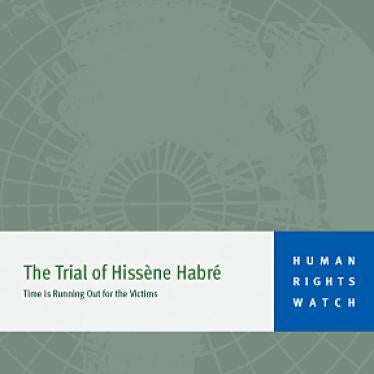The scheduled trial in Chad of 26 former state security agents of the Hissène Habré dictatorship is a significant step in the long struggle of the survivors for justice, Human Rights Watch said today. Amid fears that the case was being rushed through, however, the group called on the Chadian authorities to ensure that the trial, to begin in N’Djaména on November 14, is carried out in a fair and transparent manner.
The trial of Habré government (1982-1990) officials comes as the Extraordinary African Chambers in Dakar, Senegal, wraps up their investigation into alleged crimes by the former dictator. That court indicted Habré in July 2013 and, if the investigating judges decide that there is sufficient evidence, his trial is scheduled to begin in May 2015.
"The survivors, widows and orphans of Habré’s government have been campaigning for 24 years to see Habré and his accomplices face trial," said Reed Brody, counsel for Human Rights Watch, who has worked with Habré’s victims since 1999. "The trial of Habré’s alleged henchmen could be a major event in Chad’s history, but a tainted process would be an insult to the victims."
The defendants are accused of murder, torture, kidnapping, arbitrary detention, and assault and battery. Two of the defendants are Saleh Younouss, a former director of the Directorate of Documentation and Security Directorate (DDS), Habré’s political police, and Mahamat Djibrine described as one of the “most feared torturers in Chad” by Chad’s National Truth Commission. These suspects are also wanted by the Extraordinary African Chambers, but Chad declined to transfer them, and refused a request by the Chambers to travel to Chad to interview them. An African Union delegation arrived in Chad on November 9 for consultations, and will travel on to Senegal on November 17.
A group of Habré’s victims first filed complaints against fifty former security agents before the Chadian courts in October 2000, 10 months after they had filed a case against Habré in Dakar. The Chadian case languished for more than a decade. It was only in May 2013, shortly after the creation of the Extraordinary African Chambers in Dakar, that the Chadian justice system actively began to move on the case, arresting and indicting several of the former agents.
On September 4, 2014, judge Amir Abdoulaye Issa of the High Court of N'Djamena, issued an order holding over for trial 21 Habré-era officers. After appeals by the prosecutor, victims, and the accused, the Indicting Chamber on October 23 indicted 29 former agents.
The victims’ lawyers fear that the Chadian authorities are trying to rush the case through without the attention and preparation it deserves, perhaps to justify the non-transfer of Younouss and Djibrine to Dakar. According to the victims’ lawyers, they were only notified that the case was proceeding the day it appeared on the docket of the Indicting Chamber. The Chamber’s decision was, unusually, handed down from the bench and distributed in manuscript form. Many of the complainants were not interviewed by the investigating judge, who did not arrange the standard confrontations between the complainants and the defendants. The trial date was announced by the prosecutor on October 30, one week after the Indicting Chamber decision, giving all sides only two weeks to prepare for this important trial.
"If the trial meets international standards, then the victims will begin to regain the dignity they have been seeking for 24 years," said Jacqueline Moudeina, lead counsel for the victims and president of the Chadian Association for the Promotion and Defense of Human rights (ATPDH). "But the speed with which the Chadian judiciary is now moving the case, after years of delay, raises fears of a rushed, ill-prepared trial."
The Indicting Chamber’s decision referred 29 persons for trial, but three had been listed by the investigating judge as dead, another apparent sign of haste. A fourth accused cannot be located. The name of another alleged torturer charged by the investigating judge and referred to the Indictment Chamber disappeared from the list for no apparent reason. So it appears that 25 former officials will be present at the trial.
Other defendants include Warou Fadou Ali, a former DDS sub-director, and Nodjigoto Haunan, former director of the National Security Agency (Sureté nationale), both implicated in the repression against the Zaghawa ethnic group, and Khalil Djibrine, former department head of the DDS in the south of Chad during the repression there of 1983-1984. A full list of those standing trial can be found here.
Habré was president of Chad from 1982 until he was deposed in 1990 by the current president, Idriss Déby Itno, after which Habré fled to Senegal and lived in exile. Habre’s one-party rule was marked by widespread atrocities, including the targeting of certain ethnic groups. DDS files recovered by Human Rights Watch in 2001 reveal the names of 1,208 people who were killed or died in detention, and 12,321 victims of human rights violations. He was indicted by the Extraordinary African Chambers in July 2013 and placed in pretrial detention.






